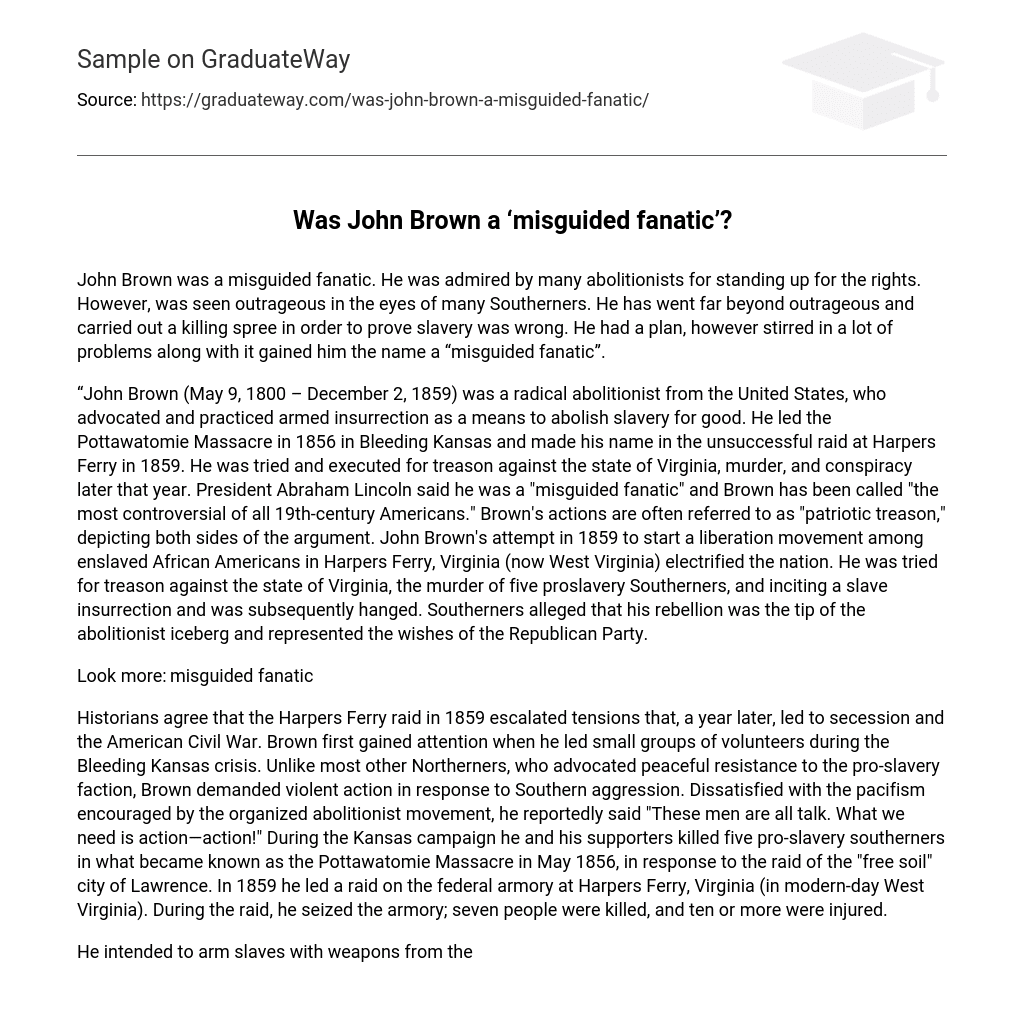John Brown was a misguided fanatic. He was admired by many abolitionists for standing up for the rights. However, was seen outrageous in the eyes of many Southerners. He has went far beyond outrageous and carried out a killing spree in order to prove slavery was wrong. He had a plan, however stirred in a lot of problems along with it gained him the name a “misguided fanatic”.
“John Brown (May 9, 1800 – December 2, 1859) was a radical abolitionist from the United States, who advocated and practiced armed insurrection as a means to abolish slavery for good. He led the Pottawatomie Massacre in 1856 in Bleeding Kansas and made his name in the unsuccessful raid at Harpers Ferry in 1859. He was tried and executed for treason against the state of Virginia, murder, and conspiracy later that year. President Abraham Lincoln said he was a “misguided fanatic” and Brown has been called “the most controversial of all 19th-century Americans.” Brown’s actions are often referred to as “patriotic treason,” depicting both sides of the argument. John Brown’s attempt in 1859 to start a liberation movement among enslaved African Americans in Harpers Ferry, Virginia (now West Virginia) electrified the nation. He was tried for treason against the state of Virginia, the murder of five proslavery Southerners, and inciting a slave insurrection and was subsequently hanged. Southerners alleged that his rebellion was the tip of the abolitionist iceberg and represented the wishes of the Republican Party.
Look more: misguided fanatic
Historians agree that the Harpers Ferry raid in 1859 escalated tensions that, a year later, led to secession and the American Civil War. Brown first gained attention when he led small groups of volunteers during the Bleeding Kansas crisis. Unlike most other Northerners, who advocated peaceful resistance to the pro-slavery faction, Brown demanded violent action in response to Southern aggression. Dissatisfied with the pacifism encouraged by the organized abolitionist movement, he reportedly said “These men are all talk. What we need is action—action!” During the Kansas campaign he and his supporters killed five pro-slavery southerners in what became known as the Pottawatomie Massacre in May 1856, in response to the raid of the “free soil” city of Lawrence. In 1859 he led a raid on the federal armory at Harpers Ferry, Virginia (in modern-day West Virginia). During the raid, he seized the armory; seven people were killed, and ten or more were injured.
He intended to arm slaves with weapons from the arsenal, but the attack failed. Within 36 hours, Brown’s men had fled or been killed or captured by local farmers, militiamen, and U.S. Marines led by Robert E. Lee. Brown’s subsequent capture by federal forces, his trial for treason by the state of Virginia, and his execution by hanging in Charles Town, Virginia (now West Virginia) were an important part of the origins of the American Civil War, which followed sixteen months later. When Brown was hanged after his attempt to start a slave rebellion in 1859, church bells rang, minute guns were fired, large memorial meetings took place throughout the North, and famous writers such as Emerson and Thoreau joined many Northerners in praising Brown. Historians agree John Brown played a major role in starting the Civil War. His role and actions prior to the Civil War as an abolitionist, and the tactics he chose, still make him a controversial figure today.
He is sometimes memorialized as a heroic martyr and a visionary and sometimes vilified as a madman and a terrorist. Some writers, such as Bruce Olds, describe him as a monomaniacal zealot, others, such as Stephen B. Oates, regard him as “one of the most perceptive human beings of his generation.” David S. Reynolds hails the man who “killed slavery, sparked the civil war, and seeded civil rights” and Richard Owen Boyer emphasizes that Brown was “an American who gave his life that millions of other Americans might be free.” For Ken Chowder he is “at certain times, a great man”, but also “the father of American terrorism.” ”
So in the end, John Brown was a misguided fanatic. He strived so mush for the right that slavery was wrong that he carried out a plan to make and attempt to kill many people who believed in slavery. His killing spree caused him to earn the name of a misguided fanatic.





